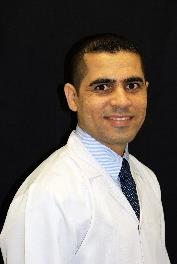Testimonials
 Aditi Sharma, MD
Aditi Sharma, MD
Residency Class of 2025
“The ability to quickly place an ultrasound probe in an acutely ill patient is invaluable. There have been countless nights and rapid responses where using ultrasound allowed us to diagnose and treat much faster than waiting for a chest x-ray or additional imaging. Learning procedures under ultrasound guidance has significantly boosted my confidence. One of the biggest strengths of this program is its ultrasound training, which was a key factor in my decision to stay here as a resident and apply for the POCUS track. From day one of intern year, when I had no experience with ultrasound, I’ve been able to consistently practice, receive feedback from multiple attendings—especially on wards—and now feel confident in my point of care ultrasound skills. No matter what specialty you pursue, point-of-care ultrasound has countless applications, and getting this training in residency has been incredibly valuable.”
 Tess Hennessee, MD
Tess Hennessee, MD
Residency Class of 2024
“The POCUS track of Internal Medicine provides exceptional training in the use of bedside ultrasound as an extension of everyday physical exam. As a resident on this track, I went from not knowing how to hold the probe to being proficient, CHEST-certified bedside ultrasonographer, using this skill every day in my practice. The track director, Dr. Robert Nathanson, serves as a mentor for POCUS residents; he provided exceptional education in the current POCUS literature, trained us in the possibilities and limitations of bedside use, involved us in teaching skills to the entire residency program, and coauthored novel publications with residents in this field. These skills and accomplishments set POCUS track residents ahead, whether in application to fellowship or employment in hospital medicine. In my case, I was the only graduating resident considered for my current dream hospitalist job, in part because of the skill in bedside ultrasound that set me apart. I feel incredibly fortunate, like I got an additional training within training, and one that I am so passionate about that I will continue to use daily and keep teaching to other clinicians going forward.”
 Jacob Schmelz, MD
Jacob Schmelz, MD
Residency Class of 2023
“The repeated exposure and hands on practice, with feedback from POCUS experts, built my confidence in using ultrasound at the bedside. Having this in my toolbelt came in handy time and time again, whether I was on Cardiology evaluating patients with heart failure and acute MI, the ICU team responding to patients in acute respiratory failure overnight, or the Medicine wards working up sepsis. I feel lucky to have trained at a program where I learned such versatile skills.”
 Stephanie Ibrahim, MD
Stephanie Ibrahim, MD
Residency Class of 2022
“I am very thankful for my experience at UTHSCSA learning POCUS and procedures. I have been a hospitalist for a year now and am the only one in my group that is POCUS certified, while some of my partners are trying to complete their certifications amid their busy inpatient schedules, which is a huge advantage!
I am lucky to be a part of an academic program and get to have residents rotate with me on the procedure service. Having strong foundational skills in procedures allows me to feel confident teaching residents. Thanks to the training at UTHSCSA, I am one of few faculty that does LPs with ultrasound guidance, and the residents find that they are much more comfortable learning LPs this way.
I found that my training at UTHSCSA has made me much more prepared to be a hospitalist and be on faculty.”
 Juan Rico Mesa, MD
Juan Rico Mesa, MD
Residency Class of 2021
“Training in internal medicine at UTHSA has been the best academic experience I have had during my training journey. As an intern, UTHSA provided me with the tools to become a confident physician, and allowed me to work with top physicians in the country and find robust, long-term and meaningful mentorship.
As an upper-level resident, our internal medicine residency program was flexible with our long-term goals; I was encouraged to take electives in my areas of interest (i.e Heart Station/Echo lab, Airway elective, POCUS, away rotations, clinical research, procedure team) and allowed me to pursue my goal of becoming a well-rounded internist and a future successful interventional cardiologist. I know that many programs have very good things to offer, but what makes UTHSA stand out and makes it the best program in Texas is its supportive leadership within the residency program, who always go out of their way to support us.
When it comes to the fellowship transition, I felt solid and confident making the transition. I was highly well-trained in procedures and ready to perform multiple central/arterial access confidently, with additional knowledge in cardiac imaging, comprehensive knowledge in critical care medicine, and overall medical knowledge, which made my IM board preparation a doable experience during fellowship.
Among the things I like the most about UTHSA is the collegiality, no matter where we went for fellowship, we all keep in touch and are thankful for the physicians UTHSA made of us. We enjoy keeping in contact with our attendings and mentors over time, and we definitely hope to join back as faculty one day.”
 Ali Hussein
Ali Hussein
Residency Class of 2019
“I believe my training at UT Health San Antonio opened a lot of doors for me. Initially it wasn’t very clear to me what I wanted to do after residency, but having all the fellowships available and the ability to interact with the fellows, gave me a significant exposure to these subspecialties, and the ability to do different electives was an excellent way to experience those subspecialties in a more detailed way.
The other important aspect of training at UT Health San Antonio is having your training in a county hospital and also at a VA hospital, that helped with significant exposure to diverse and underserved population and different pathologies including rare ones as well, and I will always remember my 23 years old man with pulmonary-renal syndrome I took care of during my ICU rotation in my intern year, his survival through a complicated case of Goodpasture syndrome made me think of rheumatology as a career path seriously.
The things that I had in my residency that I think helped me thrive through fellowship was the amount of exposure to different pathologies, and also the work load that you have to go through, it significantly improves your efficiency, and the fact that you have such a wonderful support system from your leadership, your faculty, and your co-residents and interns was an essential part to be able to go through the rigors of residency and be the best version of yourself.
Another important aspect was the significant amount of POCUS training, during your elective and also during your ER and ICU rotation, it makes you become more familiar with using ultrasound in general, and that helped me a lot in my rheumatology fellowship as well. Not to mention the availability of procedures training, as I had the chance to do many joints injections during my residency even though it wasn’t required; everything is available if you are interested.
All in all, if I were given the opportunity to choose my training again, I wouldn’t think twice before choosing UT Health San Antonio again.”
